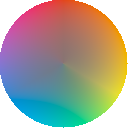1 unstable release
| 0.0.1 | Mar 2, 2020 |
|---|
#40 in #gradient
54KB
570 lines
palgrad

palgrad is a command line utility that creates color gradients and palettes from user input colors.
Gradients are created in Lch color space (also known as HCL), the cylindrical representaiton of the Lab or L*a*b* color space. Using this color space, gradients are generally more vibrant and visually appealing than other spaces like HSV or RGB.
Features
- Radial and linear continuous gradients
- Radial continuous gradients with overlay
- Radial and linear stepped gradients
- Declare colors in
Lch,HSV, andRGB
Some ideas for using the output:
- gamut masking
- pixelization to make more color swatches
- bring into digital painting programs to color pick from as limited palettes and apply more filters
- website/application color themes
This crate uses palette to handle the heavy lifting of color conversion.
Documentation
To be updated
Examples
Overlay color on radial gradient

palgrad -c -o -s 128
Overlay a 50% grey over the default RGB colors in -c with a size of 128x128 pixels. An overlay RGB color can be specified after the -o argument.
Stepped radial gradient

palgrad --hsv -n 5 -s 128 -r 0.25
Use the default HSV colors --hsv, 5 steps between the colors, size of 128x128, and inner radius factor of -r 0.25.
Stepped linear gradient
![]()
palgrad -l -d -n 8 --ss 30x20
Make a linear gradient -l with the default RGB decimal colors -d, 8 steps between the two colors, and the swatch sizes are 30x20 pixels each. To make a continuous gradient, omit the steps argument -n.
License
This crate is licensed under either
- the MIT License, or
- the Apache License (Version 2.0)
at your option.
Dependencies
~7.5MB
~137K SLoC
